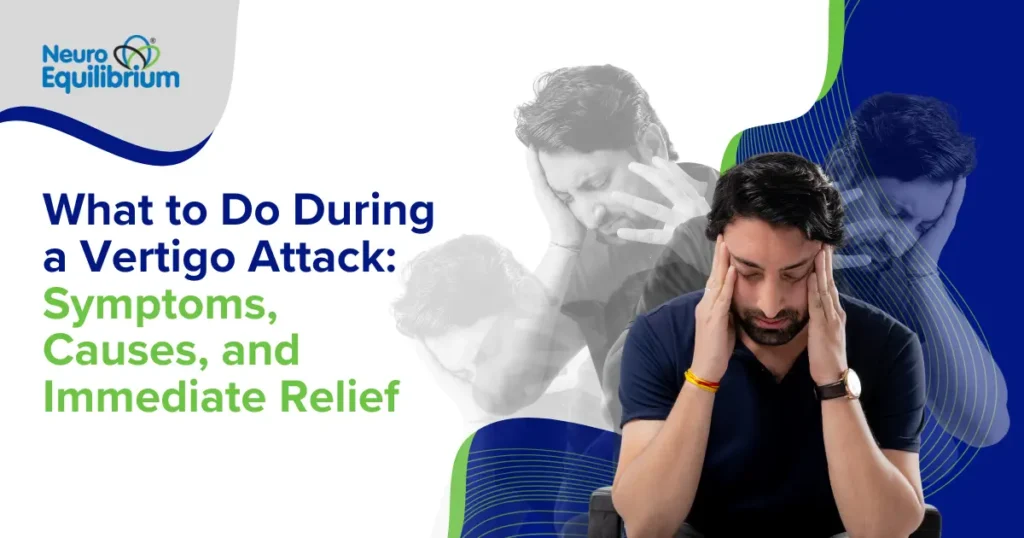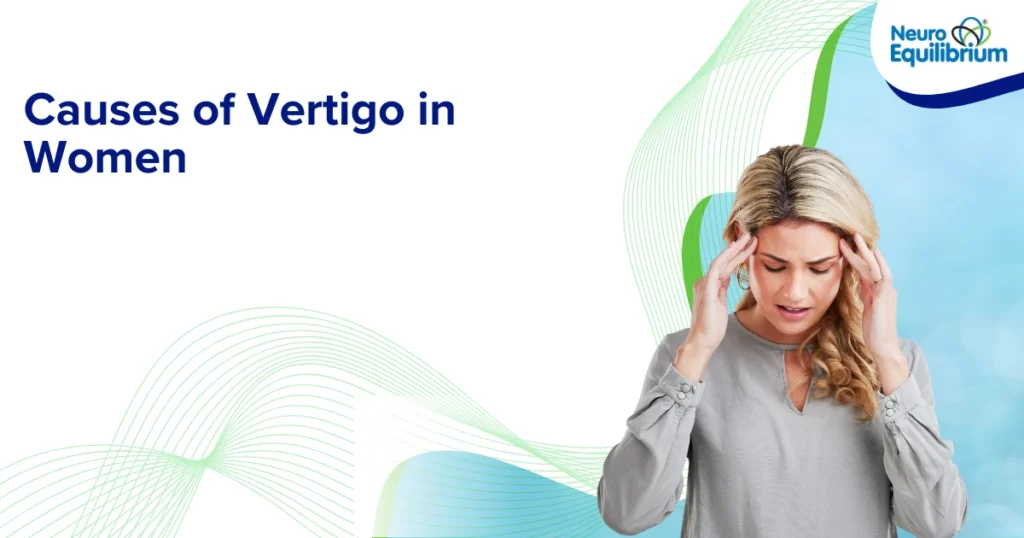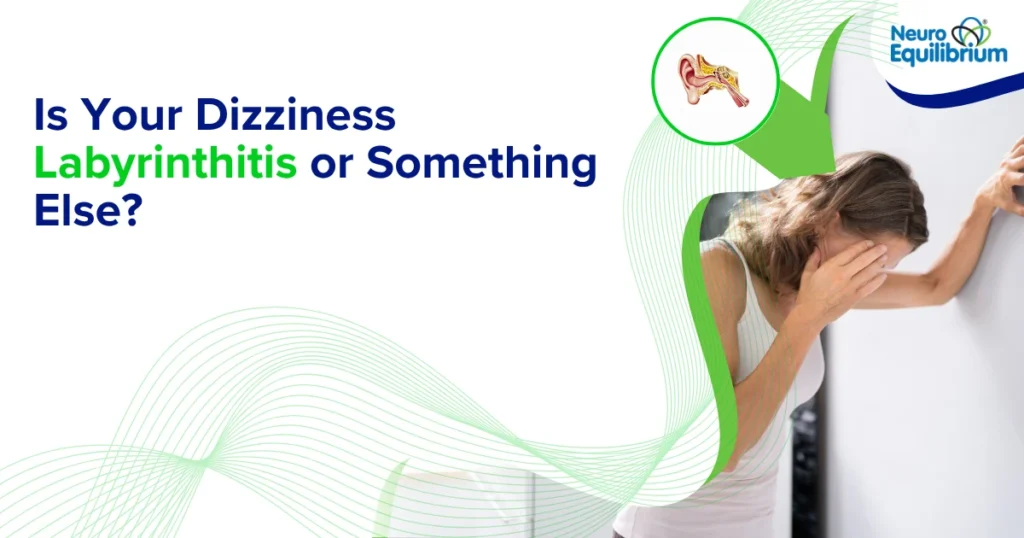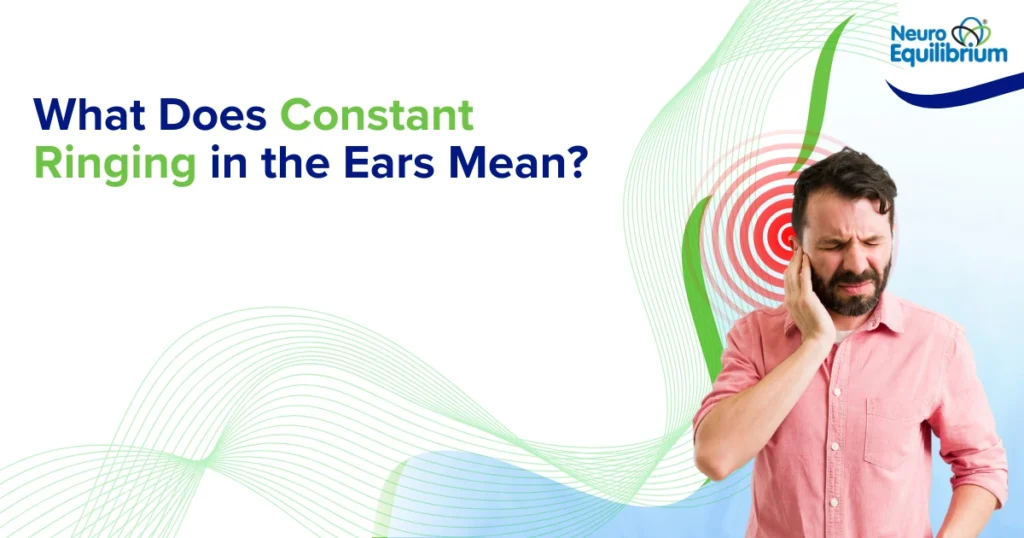What is Vertigo?
Vertigo is a condition where you feel like you’re spinning or unsteady. This can make everyday tasks like walking or standing difficult. It may last for a few minutes to hours.
According to the cause,vertigo is primarily of two main types-
- Peripheral Vertigo: This is caused by disorder of the inner ear.
- Central Vertigo: This happens when there’s a problem linked to the brain, often in the parts that help with balance and coordination of the body
Knowing what vertigo is and how to handle it is the key to the best way to manage it.
What Happens During a Vertigo Attack?
Mixed Signals:
Your inner ear helps you stay balance like a built-in GPS system. But if something goes wrong in the ear (say, due to an infection or raised fluid pressure ), it can send the wrong signals to your brain.your ear might tell your brain that the head is moving but your eyes don’t see any movement. This sensory mismatch causes the dizzy feeling.
What You Feel:
During a vertigo attack, you might experience:
- Spinning or Tilting: You feel like the room is moving or you’re losing balance.
- Nausea or Vomiting: You might feel sick to your stomach.
- Trouble Standing or Walking: It’s hard to stay steady, and you may require support to move around.
- Blurry Vision: Your eyes may have difficulty focusing, especially if there’s movement.
- Sweating and Fast Heartbeat: Your body might feel anxious, causing you to sweat or feel your heart race.
- Ringing in the Ears or Hearing Problems: You might hear ringing in the ear or hearing loss. If the problem is involving both the anditory (hearing) and vestibular (balance) system.
How Long Does It Last?
A vertigo attack can last anywhere from a few seconds to a few hours. The spinning usually stops faster if you remain still and avoid moving your head too much.
What Causes Vertigo?
There are a few different reasons why you might experience vertigo. Here are some common causes:
Meniere’s Disease: This affects the inner ear and causes episodes of vertigo, hearing loss, and ringing in the ears. It’s due to increased fluid pressure in the ear, usually affecting one side, though about 15% of cases impact both ears. If left untreated, it can lead to permanent hearing loss.
Vestibular Neuritis: This happens when a viral infection inflames the vestibular nerve, which controls balance. It causes dizziness, blurry vision, and nausea.
BPPV (Benign Paroxysmal Positional Vertigo): This occurs when tiny crystals in the ear shift to the wrong position, causing short bursts of dizziness, usually triggered by head movements.
Vestibular Migraine: This is a type of migraine that causes dizziness along with headaches, light sensitivity, and motion sickness. It affects about 10% of the population, mostly women.
Labyrinthitis: This is an infection of the inner ear that causes dizziness, hearing loss, and tinnitus (ringing in the ears). The hearing loss is usually very severe.
Perilymph Fistula: This happens when fluid from the inner ear leaks into the middle ear through a small tear. It can trigger vertigo during activities like coughing or lifting heavy weight.
Mal de Debarquement Syndrome (MdDS): After a long boat or plane ride, some people feel like they are still swaying, even when they’re back on solid ground.
Acoustic Neuroma: A non-cancerous tumor on the balance nerve can cause dizziness, hearing loss, and facial numbness.
Multiple Sclerosis (MS): MS is a disease that damages nerve covering and disrupts the signals to the brain, leading to vertigo, vision problems, and balance issues.
Why Understanding Vertigo Matters
Vertigo is more than just feeling dizzy—it can be disorienting and disruptive. Whether it’s a one-time thing or something that happens more often, understanding vertigo can help you manage it better. If you or someone you know is experiencing these symptoms, it’s important to seek medical help. With the right diagnosis, you can get the needed treatment and return to feeling steady.
What to Do During a Vertigo Attack
Vertigo can make it feel like everything around you is spinning, which can be scary and difficult to deal with. However, there are steps you can take to feel better and stay safe.
Sit or Lie Down Right Away
When vertigo starts, sit or lie down somewhere safe so you don’t fall. Stay still and avoid trying to walk or move around until the spinning stops.
Focus on Something Still
Look at a steady object, like a picture or a piece of furniture. This can help your brain calm down and reduce the spinning sensation.
Prevent Sudden Movements
Quickly moving your head or rising too swiftly can intensify dizziness. Instead, take slow and deliberate actions to maintain steadiness.
Stay in a Quiet, Dim Space
Bright lights or loud sounds can make vertigo feel worse. Go to a calm, quiet room with soft lighting, or close your eyes if you’re outside.
Drink Water
If you’re feeling sick or dizzy, dehydration can make it worse. Sip water slowly, but avoid sugary or caffeinated drinks since they can sometimes worsen vertigo symptoms.
Take Deep Breaths
Vertigo can cause anxiety, which might make it feel even worse. Breathe deeply in through your nose and out through your mouth to stay calm.
Use Something for Support
If you need to move, hold onto a wall, railing, or sturdy furniture to help you balance. It’s also a good idea to tell someone nearby if you need help.
Avoid Driving or Operating Machines
During a vertigo episode, don’t drive or use heavy equipment because dizziness can make it unsafe.
These steps can help you manage the episode until it passes or you can see a doctor.
When to Visit a Doctor
Sometimes vertigo needs medical attention, especially if:
- It lasts for more than a few hours.
- You have other symptoms like slurred speech, double vision, or weakness in your arms or legs.
- The dizziness keeps coming back or gets worse.
Advanced clinics, like Neuro Equilibrium, offer special tests and treatments for people with recurring vertigo.
Can Vertigo Be Cured?
Many people think their balance problems can’t be fixed, but that’s not true. Vertigo, a spinning or dizzy feeling, can be treated. With the proper care, you can return to living an everyday, healthy life quickly.
Vertigo isn’t a disease; it’s a symptom. To treat it, specialist doctors need to find the real problem behind it. Tests like VNG (Video Nystagmography) help determine what’s causing vertigo, so the treatment is accurate.

Ways to Treat Vertigo
- Vestibular Exercises
Special Vestibular Rehabilitation exercises can help people regain their balance and stop feeling dizzy. These exercises can also fix vision problems caused by vertigo. If someone has a type of vertigo called BPPV (Benign Paroxysmal Positional Vertigo), doctors perform remarkable moves like the Epley or Semont maneuvers to reposition tiny crystals in the ear that cause dizziness. - Medications
In certain situations, medications can help ease the dizziness and nausea linked to vertigo. Vertin, Stugeron, or Stemetil may be prescribed for short-term symptom relief. However, using these medications for longer than five days can carry risks, so doctors generally recommend stopping them quickly. - Surgery
In sporadic cases, surgery might be needed for vertigo. However, surgeries for inner ear problems are complex and done only when necessary.
How to Prevent Vertigo
Taking care of your body and knowing your triggers can help reduce vertigo episodes:
Do Balance Exercises
Special physical therapy, called vestibular rehabilitation, helps your brain and inner ear work together to improve balance.
Learn Your Triggers
Certain movements or situations might cause vertigo for you. Keep track of these triggers and avoid them when you can.
Schedule Regular Health Check-Ups
Occasionally, vertigo can be associated with other health concerns such as ear infections or blood pressure issues. Addressing these conditions early can help avert dizziness.
Follow Your Doctor’s Advice
If your doctor gives you medicine for vertigo or an underlying condition, take it as prescribed. This can help control your symptoms.
Conclusion
Vertigo can feel overwhelming, but understanding it and knowing what to do can make it easier to handle. In most cases, it goes away on its own, but if it doesn’t, seeing a doctor is important. With the right steps, like lifestyle changes, physical therapy, and regular check-ups, you can manage vertigo and get back to living without fear of spinning episodes.
At Neuroequilibrium, we leverage advanced technologies such as virtual reality to enhance vestibular therapy’s effectiveness. These treatments aim to accelerate patient recovery and promote prolonged well-being.Patients get a personalized treatment plan based on their symptoms and health problems. The therapy includes exercises to improve balance, reduce dizziness, and ease visual issues. Doctors also check progress regularly and change the treatment to relieve patients faster.
FaQs For Vertigo Attack
What is the difference between vertigo and general dizziness?
Dizziness and vertigo are often confused, yet they are distinct sensations. Vertigo presents as a feeling of spinning or whirling, even when both the individual and their surroundings remain still. In contrast, dizziness is a broader term that encompasses feelings of faintness, lightheadedness, or balance issues that do not involve vertigo. Recognizing this difference is crucial for accurate diagnosis and effective treatment. While vertigo is linked to issues with the inner ear or brain, dizziness can stem from causes like dehydration, low blood sugar, or abrupt changes in posture. Being aware of these symptoms can help identify the underlying issue and facilitate appropriate care treatment.
Book a consultation at your nearest NeuroEquilibrium Clinic today.
What causes vertigo to occur suddenly?
Sudden vertigo can arise from various factors. Peripheral issues, like Benign Paroxysmal Positional Vertigo (BPPV), occur when small crystals in the inner ear become dislodged, resulting in dizziness during certain head movements. Infections such as vestibular neuritis or labyrinthitis can also cause sudden episodes. On the other hand, central factors may include strokes, migraines, or neurological disorders. Additional elements, like stress, dehydration, or quick changes in position, can worsen symptoms. It’s essential to determine the underlying cause through a medical assessment for effective treatment and prevention of future episodes, especially when vertigo occurs unexpectedly and disrupts daily life activities.
Book a consultation at your nearest NeuroEquilibrium Clinic today.
What should I do during a vertigo attack?
If you experience vertigo, it is best to stay seated and refrain from quick head movements that could aggravate the episode. For lightheadedness, find a seated or lying position to prevent fainting. When feeling dizzy, focus on a stationary object or fixate on a specific point. Avoid sudden movements, as they could exacerbate the sensation. Rest in a calm, dimly lit space to minimize sensory stimulation. If possible, hydrate with water to prevent dehydration, which could worsen dizziness. Most episodes resolve on their own; however, if symptoms persist for hours, intensify, or are accompanied by severe headaches, vision changes, or numbness, seek medical attention.
Book a consultation at your nearest NeuroEquilibrium Clinic today.
Can lifestyle changes help prevent vertigo?
Indeed, making lifestyle changes can lessen the occurrence and intensity of vertigo episodes. Participate in vestibular rehabilitation exercises to enhance balance and coordination. Be mindful of and steer clear of triggers you know, such as abrupt head movements or bright lights. Stay hydrated and eat a balanced diet, cutting down on excessive salt and caffeine if you have Meniere’s disease. Regular health check-ups can help identify and treat underlying issues like high blood pressure or ear infections. Additionally, employing stress management strategies, such as yoga or meditation, may aid in preventing vertigo associated with migraines or anxiety, allowing for better symptom control.
Book a consultation at your nearest NeuroEquilibrium Clinic today.
When should I seek medical attention for vertigo?
If your vertigo symptoms persist for several hours, frequently return, or worsen, seek medical assistance. It is also important to see a specialist doctor if vertigo occurs alongside severe headaches, slurred speech, vision problems, weakness, or issues with walking, as these may signal serious conditions such as a stroke or brain injury. For those with recurring symptoms, specialized clinics offer in-depth testing and personalized treatment plans. Prompt diagnosis and treatment can help identify the underlying cause of vertigo, lessen its effects on daily activities, and prevent possible complications.
Book a consultation at your nearest NeuroEquilibrium Clinic today.
















